Items
Tag is exactly
professor
-
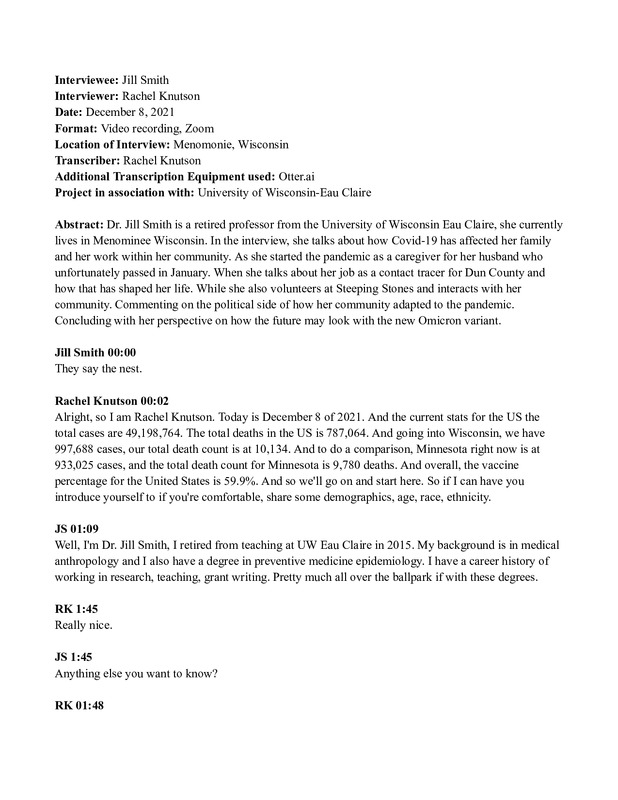 12/08/2021
12/08/2021Jill Smith Oral History, 2021/12/08
Dr. Jill Smith is a retired professor from the University of Wisconsin Eau Claire, she currently lives in Menominee Wisconsin. In the interview, she talks about how Covid-19 has affected her family and her work within her community. As she started the pandemic as a caregiver for her husband who unfortunately passed in January. When she talks about her job as a contact tracer for Dun County and how that has shaped her life. While she also volunteers at Steeping Stones and interacts with her community. Commenting on the political side of how her community adapted to the pandemic. Concluding with her perspective on how the future may look with the new Omicron variant. -
2020-03
Old dog/new tricks! a new way to teach.....
I finally became a video star.....that was never my intention when I started teaching fifty years ago! I am an adjunct art professor. When lockdown came and I couldn't teach in person, I had to find a new way to teach my class.....Zoom felt too complicated to me so I communicated with my students via email and videos that my husband and I made in the basement! A 15 minute video took over 3 hours or more between the filming and the editing! In addition, I really had to work hard to find the best way to communicate-the most effective way to present the lesson, as no questions could be asked as I presented the material. It really got me to think and be very clear about the subject and the best way to teach it. Once in front of the camera, I made believe I was talking to my class and just ran with it! I felt comfortable once I started. It was funny though, as we had to carefully think about camera angles and outfits that worked well as I moved! After all, this was permanently on tape...And, I had to be brave! My Brooklyn/StatenIsland accent was forever heard, as well as facial features, expressions and body parts that have always plagued me be forever seen! Overall, though, a great experience!!!! Who would have thought that such an awful, disturbing period could bring about new, positive experiences! Ah, but that is life after all, isn't it? -
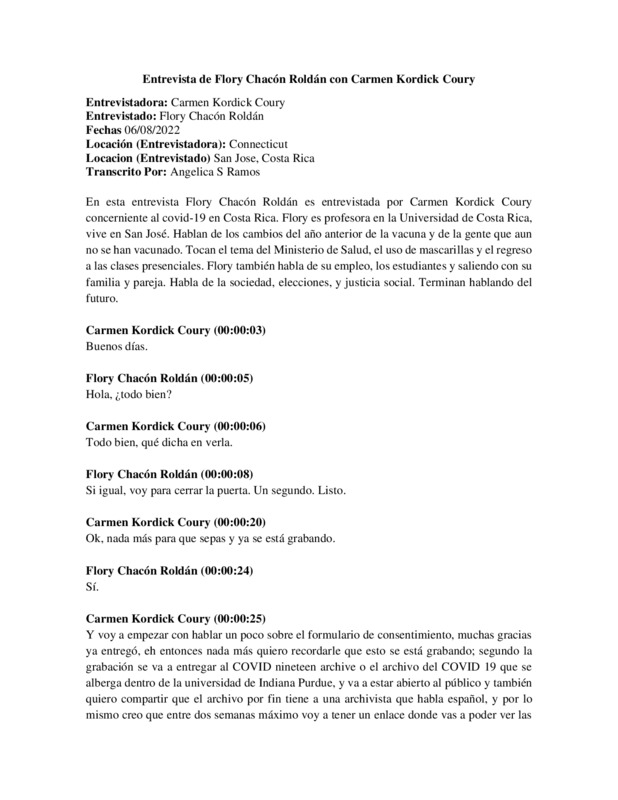 06/08/2022
06/08/2022Flory Chacón Roldán Oral History, 2022/06/08
En esta entrevista Flory Chacón Roldán es entrevistada por Carmen Kordick Coury concerniente al covid-19 en Costa Rica. Flory es profesora en la Universidad de Costa Rica, vive en San José. Hablan de los cambios del año anterior de la vacuna y de la gente que aun no se han vacunado. Tocan el tema del Ministerio de Salud, el uso de mascarillas y el regreso a las clases presenciales. Flory también habla de su empleo, los estudiantes y saliendo con su familia y pareja. Habla de la sociedad, elecciones, y justicia social. Terminan hablando del futuro. -
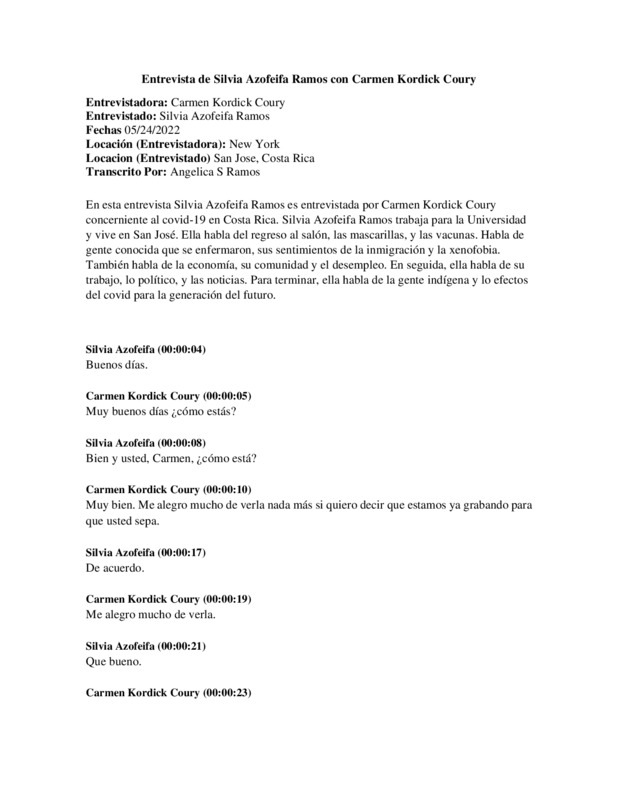 05/24/2022
05/24/2022Silvia Azofeifa Ramos Oral History, 2022/05/24
En esta entrevista Silvia Azofeifa Ramos es entrevistada por Carmen Kordick Coury concerniente al covid-19 en Costa Rica. Silvia Azofeifa Ramos trabaja para la Universidad y vive en San José. Ella habla del regreso al salón, las mascarillas, y las vacunas. Habla de gente conocida que se enfermaron, sus sentimientos de la inmigración y la xenofobia. También habla de la economía, su comunidad y el desempleo. En seguida, ella habla de su trabajo, lo político, y las noticias. Para terminar, ella habla de la gente indígena y lo efectos del covid para la generación del futuro. -
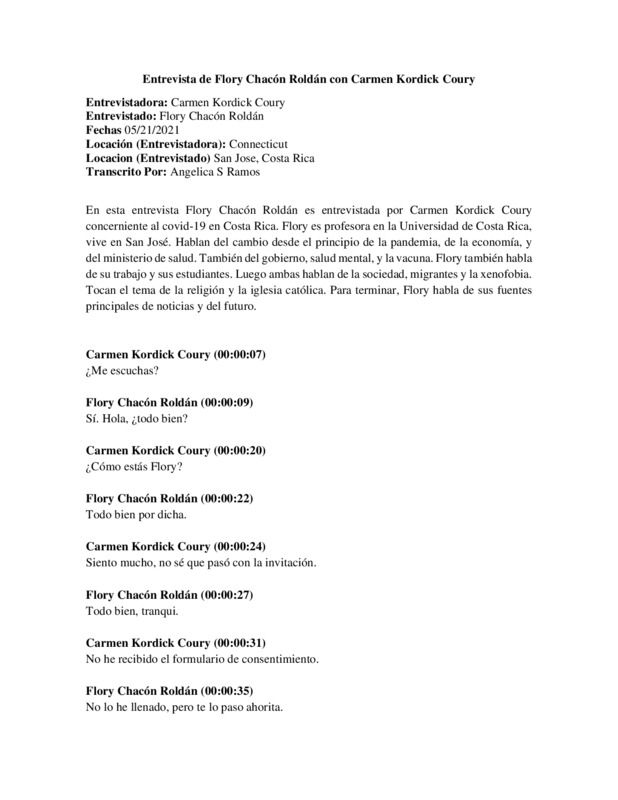 05/21/2021
05/21/2021Flory Chacón Roldán Oral History, 2021/05/21
En esta entrevista Flory Chacón Roldán es entrevistada por Carmen Kordick Coury concerniente al covid-19 en Costa Rica. Flory es profesora en la Universidad de Costa Rica, vive en San José. Hablan del cambio desde el principio de la pandemia, de la economía, y del ministerio de salud. También del gobierno, salud mental, y la vacuna. Flory también habla de su trabajo y sus estudiantes. Luego ambas hablan de la sociedad, migrantes y la xenofobia. Tocan el tema de la religión y la iglesia católica. Para terminar, Flory habla de sus fuentes principales de noticias y del futuro. -
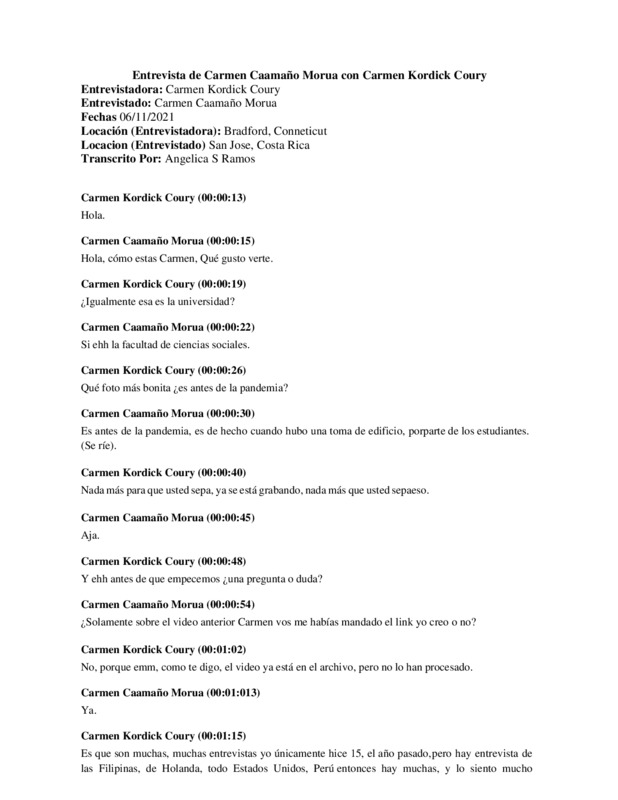 06/11/2021
06/11/2021Carmen Caamaño Morua Oral History, 2021/06/11
En esta entrevista Carmen Caamaño Morua es entrevistado por Carmen Kordick Coury concerniente al covid-19 en Costa Rica. Carmen es profesora en la Universidad de Costa Rica y vive en San José. Habla de su trabajo virtual en la universidad, del crisis de la salud mental y de la gente que cree en las teorías de la conspiración. Carmen habla de la relación entra las ciencias y la religión y como eso afecta los sentimientos hacia la vacuna. Habla de la xenofobia, el racismo y el clasismo. También habla de las vacunas y la respuesta del gobierno. Para terminar, Carmen habla del gobierno, la economía y las noticias. -
2021
Covid-19 During College
My freshman year of college was 2020. Almost all of my classes for the year were online only or online for most of the semester. This made attending classes very strange. It was not easy to ask questions online during the lecture and after class we were not always able to ask questions online. Most professors struggled just to figure out the technology to teach so it was harder for students to learn also. -
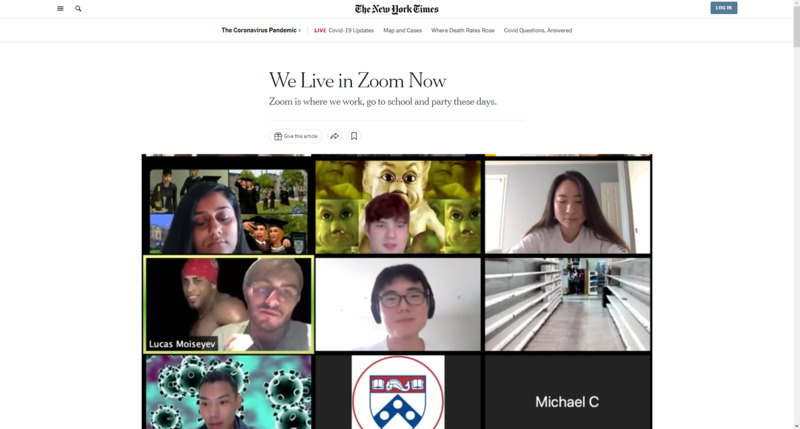 2021-10-13
2021-10-13Zoom University
While my life has changed significantly due to the covid-19 pandemic, I would say that the biggest adjustment for me was adapting to the different methods of instruction at my university. As a college student, I was used to and grew comfortable with in person instruction. This was the method of learning that I partook my entire life; the sudden change to strictly online had significant effects on my academic performance and overall retention of material. For me, it was remarkedly more difficult to grasp concepts that I would have comprehended under normal study conditions. Taking science heavy courses such as organic chemistry, instrumental analysis, physics, and molecular biology were all much more difficult than they would have been normally. It is also prudent to note the inconsistencies of professors during this time period, as they had to adjust just as much (or even more) than students. Old-school professors that did not have experience with the newest technology were forced to orient their lecture material in a format completely foreign. Needless to say, professors who were very effective instructors in person often struggled in the zoom format. Specifically, issues related to zoom that affected the quality of teaching included connection issues and students having incentives to not pay attention. For example, I took biostatistics 1 completely online, where the professor was older and not technologically adept. Every class the professor would write notes on a paper and and show it to the class. This strategy for teaching proved to be ineffective because the quality of video was not definitive, the lighting was poor, and the handwriting was small. All of these combined factors led to an entire class who had no idea what was being taught to them. While this is unfortunate, I adapted by reading more of the textbook than I would under normal circumstances, and met with the professor during office hours to work out material that I did not understand. -
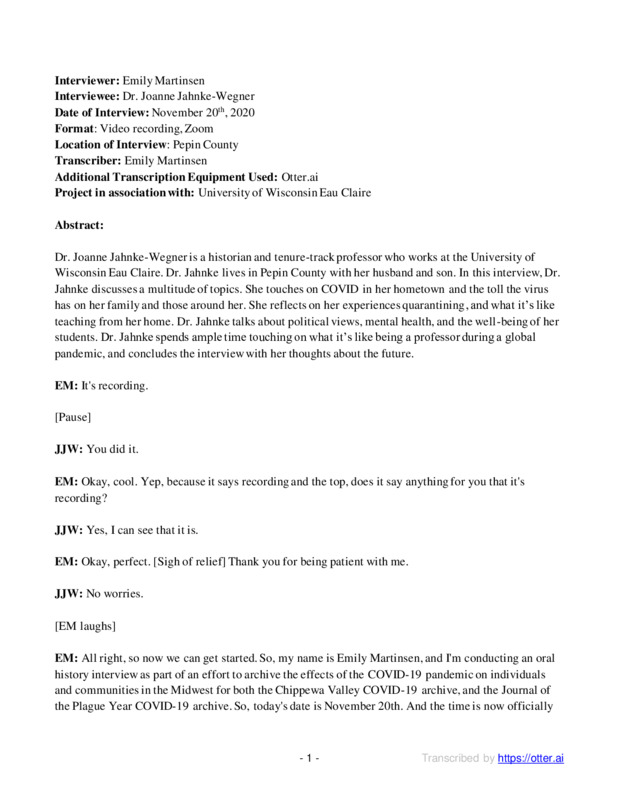 11/20/2020
11/20/2020Joanne Jahkne-Wegner Oral History, 2020/11/20
C19OH -
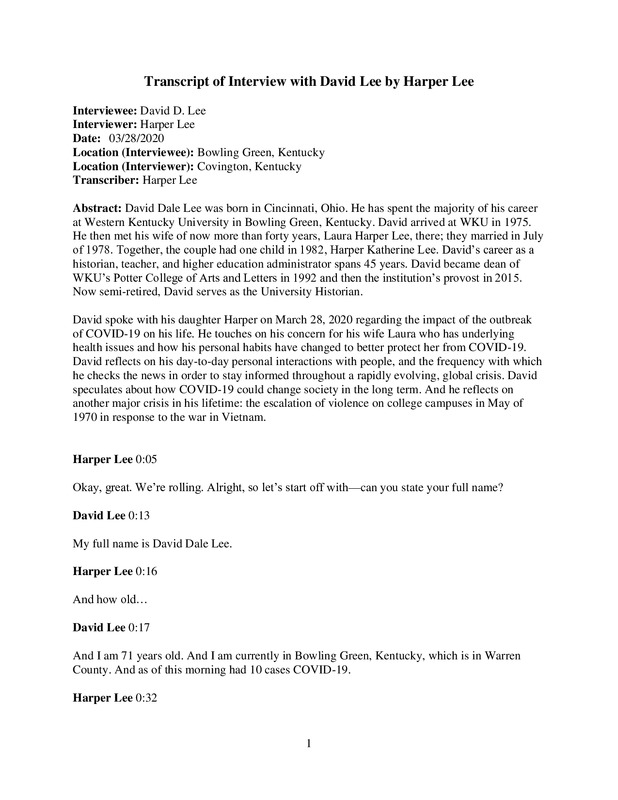 03/28/2020
03/28/2020David Lee Oral History, 2020/03/28
David Dale Lee spoke with his daughter Harper Lee on March 28, 2020, regarding the impact of the outbreak of COVID-19 on his professional and personal life. David is a semi-retired professor of history at Western Kentucky University in Bowling Green, Kentucky. David primarily discusses the impact of the pandemic on his teaching and research projects, but he also touches on changes to personal life, particularly shopping and connecting with friends via Zoom. David also reflects on other crises that have shaped his life. -
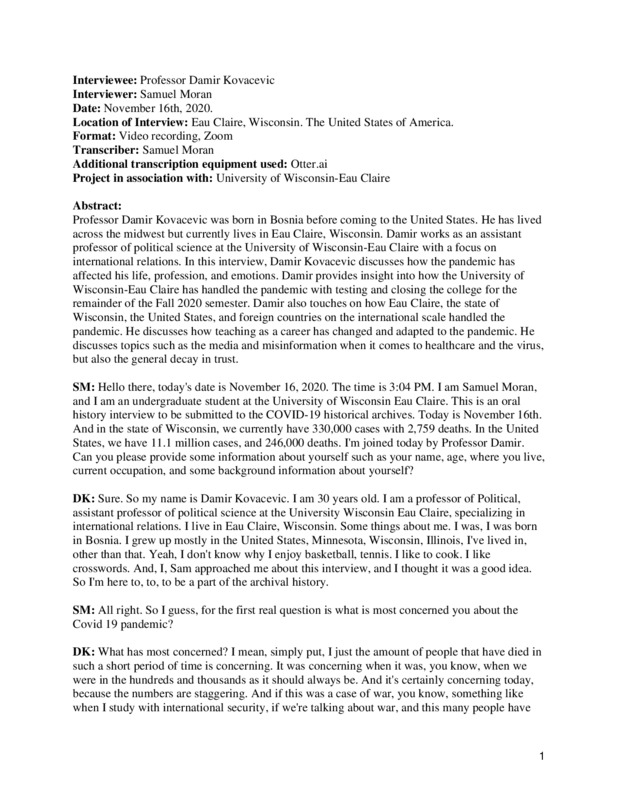 12/11/2020
12/11/2020Damir Kovacevic Oral History, 2020/11/16
Professor Damir Kovacevic was born in Bosnia before coming to the United States. He has lived across the midwest but currently lives in Eau Claire, Wisconsin. Damir works as an assistant professor of political science at the University of Wisconsin-Eau Claire with a focus on international relations. In this interview, Damir Kovacevic discusses how the pandemic has affected his life, profession, and emotions. Damir provides insight into how the University of Wisconsin-Eau Claire has handled the pandemic with testing and closing the college for the remainder of the Fall 2020 semester. Damir also touches on how Eau Claire, the state of Wisconsin, the United States, and foreign countries on the international scale handled the pandemic. He discusses how teaching as a career has changed and adapted to the pandemic. He discusses topics such as the media and misinformation when it comes to healthcare and the virus, but also the general decay in trust. -
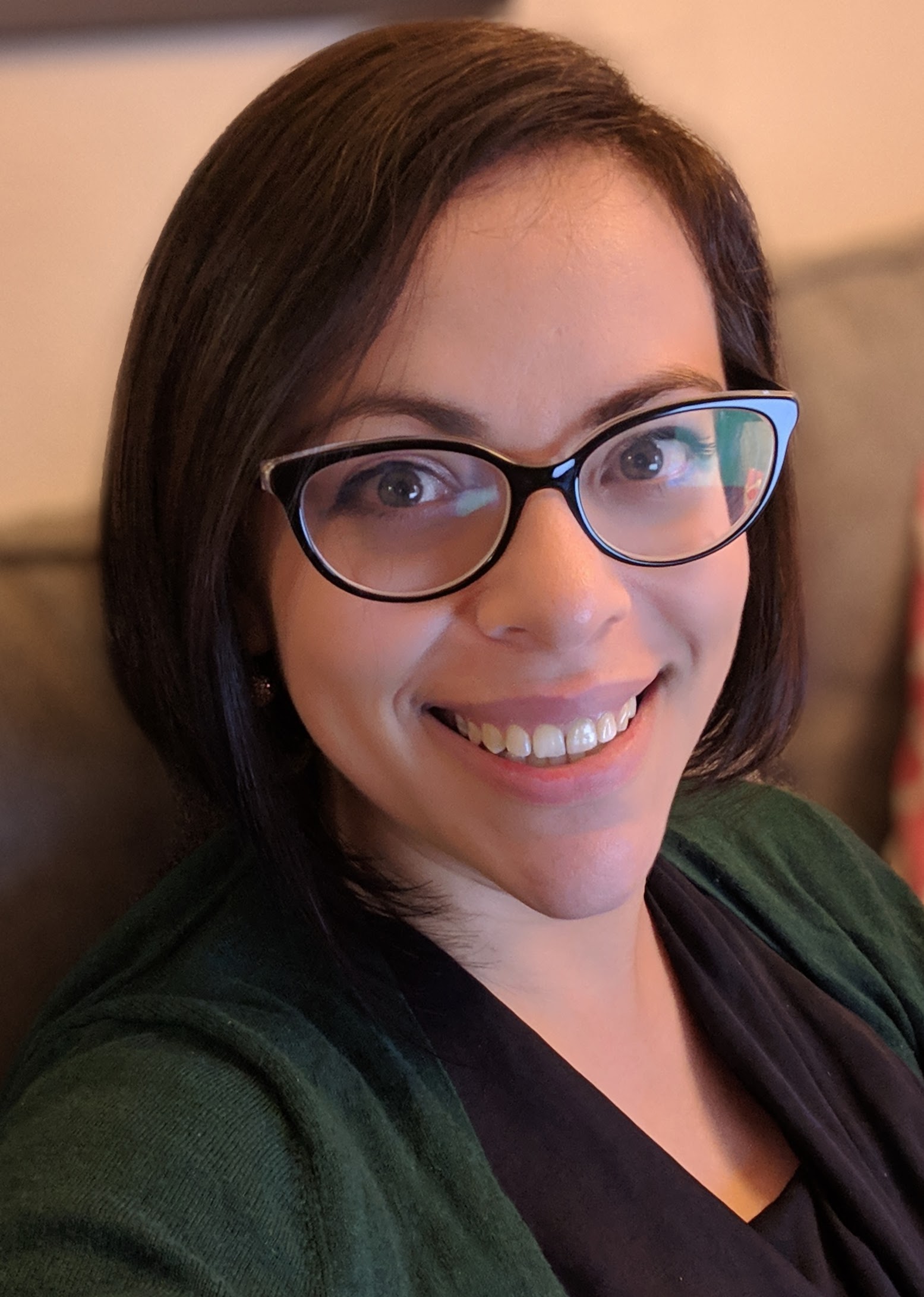 2021-11-09
2021-11-09Professor Perspective on University Changes
Dr. Sara Ronis, a theology professor at St. Mary’s University, gives us a faculty perspective on how she believes the university handled the COVID-19 pandemic. She feels that despite being in such difficult positions, the university made the decisions they knew would be best for the St. Mary’s community. As a professor, she immediately thought of her students when COVID cases began to rise and the possibility of being sent home became an even more real possibility. She admires how St. Mary’s students, new and returning, have adapted to these new learning environments. -
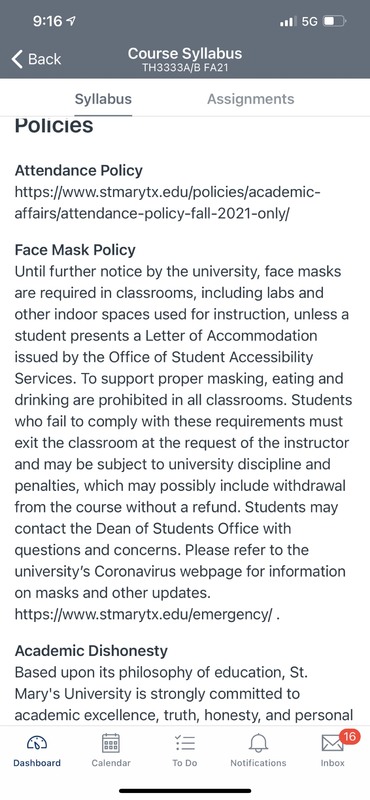 2021-08-17
2021-08-17I have to do WHAT to my syllabus???
This is a screenshot of my theology class syllabus including the newly included "face mask policy." I think this is important to include because even though all professors need to include the same information about mask policies, there are some who have just included what needed to be and other who have mentioned it in other areas of their syllabus. It's also interesting to see that this could be the first major change made to some of the professor's syllabi in some time. I submitted this item because it's a part of people's reaction to this pandemic and it heavily influenced changes in our "first-day of class routine." Coming back to school in-person after a whole year online, it was interesting to see how professors were now sharing more personal details about why they are being more careful, checking that students are wearing masks correctly, and some professors being more strict or lenient with the food/drink policy. -
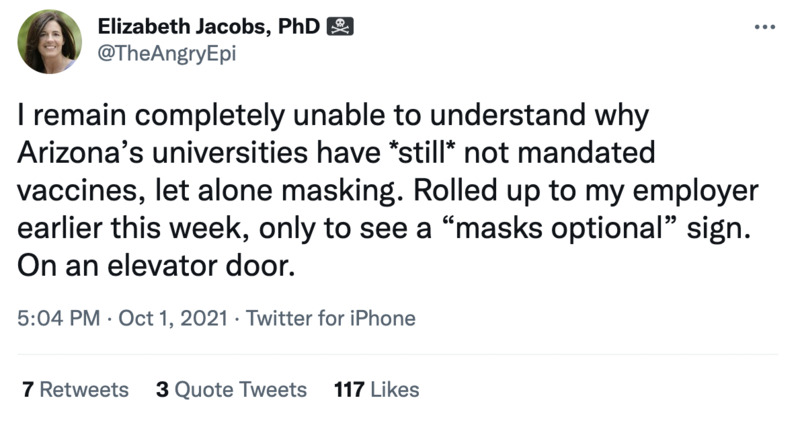 2021-10-01
2021-10-01Tucson Epidemiologist Outspoken on Twitter
Elizabeth Jacobs (@TheAngryEpi on Twitter) regularly tweets about the pandemic. She has been vocal about the University of Arizona's mitigation strategy, specifically how the university will not defy Governor Ducey's ban on mask mandates. She is a professor of Epidemiology and Biostatistics at Arizona and has played a big role in the UA Vaccine POD and COVID-related research. She is particularly outspoken about vaccines and masks in education settings, not just at the university level but also for K-12. -
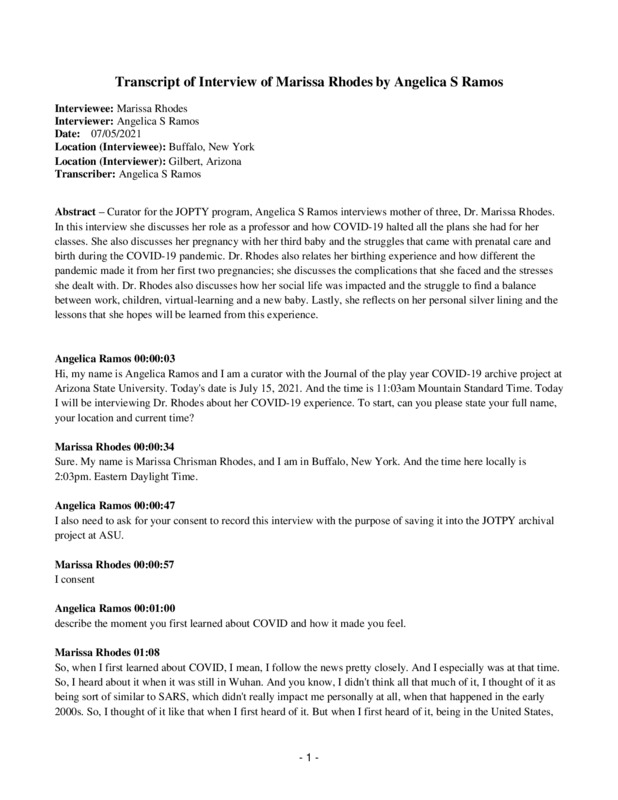 2021-07-15
2021-07-15Dr. Marissa Rhodes, Oral History, July 15, 2021
Curator for the JOPTY program, Angelica S Ramos interviews mother of three, Dr. Marissa Rhodes. In this interview she discusses her role as a professor and how COVID-19 halted all the plans she had for her classes. She also discusses her pregnancy with her third baby and the struggles that came with prenatal care and birth during the COVID-19 pandemic. Dr. Rhodes also relates her birthing experience and how different the pandemic made it from her first two pregnancies; she discusses the complications that she faced and the stresses she dealt with. Dr. Rhodes also discusses how her social life was impacted and the struggle to find a balance between work, children, virtual-learning and a new baby. Lastly, she reflects on her personal silver lining and the lessons that she hopes will be learned from this experience. -
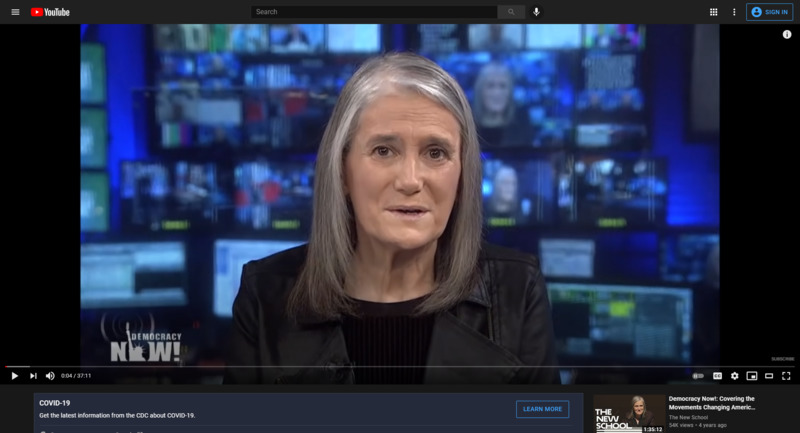 2020-03-18
2020-03-18How Will COVID-19 Change the World? Historian Frank Snowden on Epidemics From the Black Death to Now
This video is an interview the Democracy Now did with Frank Snowden, Professor Emeritus at Yale University early on in the pandemic (March 18, 2020). Dr. Snowden specializes in the history of epidemic diseases and the history of modern Italy. His father was the first African American ambassador to Italy. At the time of the interview, Dr. Snowden was in lockdown in Rome, Italy. He had gone there to research another project when the pandemic hit, so he changed his focus to studying covid-19. He contracted the disease himself, but was lucky enough to live through it. I was particularly interested in Dr. Snowden's views on the pandemic since I had watched his Yale lecture series on epidemics available on Youtube (https://www.youtube.com/playlist?list=PL3AE7B3B6917DE8E6) which was incredible in its thorough exploration of some of the worlds worst outbreaks. In the interview he states that an early modern Florentine would recognize a lot of governments' actions to combat covid-19 as very similar to those used by the Italian city-states and elsewhere in Europe to combat bubonic plague, especially the concept of quarantine. He also addresses the startling commonality between anti-Semitism during the first several plague outbreaks to the Sinophobia and xenophobia seen during our current pandemic. The interviewer also brings up a great question about the possibility of fascism arising out of strict government measures to combat disease. I was particularly curious to hear Dr. Snowden's response in light of the protests in the United States against quarantine and mask-wearing. He acknowledged that while it could be one outcome, it is not the only nor the most probable possibility. Many governments have voluntarily ended their strict measures during pandemics without devolving into fascist states. Now that the pandemic is, it seems, waning I believe it is abundantly clear that those Americans who feared that their freedoms were threatened by historically proven practices were both selfish and foolish. They and our ineffective and dangerous leadership cause the United States to become a hotbed for Covid-19, while other countries who swiftly enacted and enforced lockdown measures and mask mandates, such as New Zealand and Italy, recovered much more quickly. I contend that Donald Trump and his sheep are responsible for thousands of unnecessary deaths. -
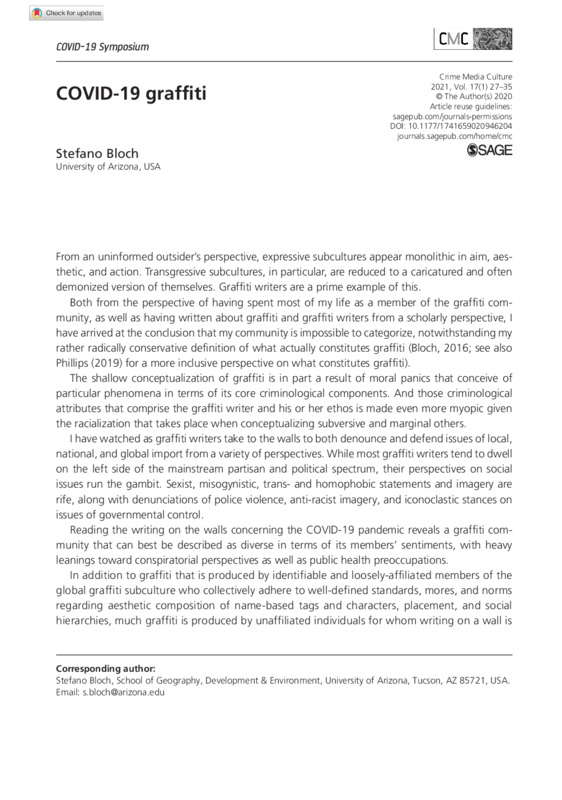 2021
2021Pandemic Street Art: "COVID-19 graffiti" by Stefano Bloch
Stefano Bloch is an Assistant Professor in the School of Geography, Development & Environment at the University of Arizona, Tucson. -
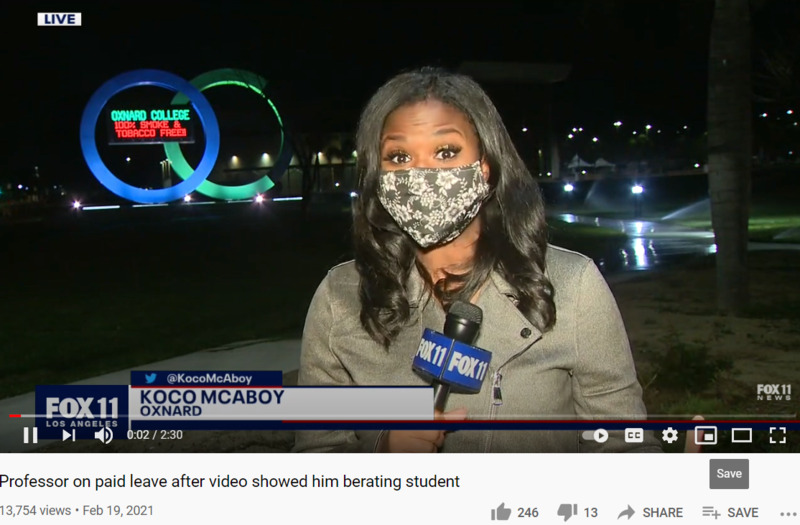 2021-02-19
2021-02-19Professor Abusive Toward HoH Student in Online Class
A professor is being placed on paid administrative leave after a viral video showed the instructor berating a student in front of the Zoom class. -
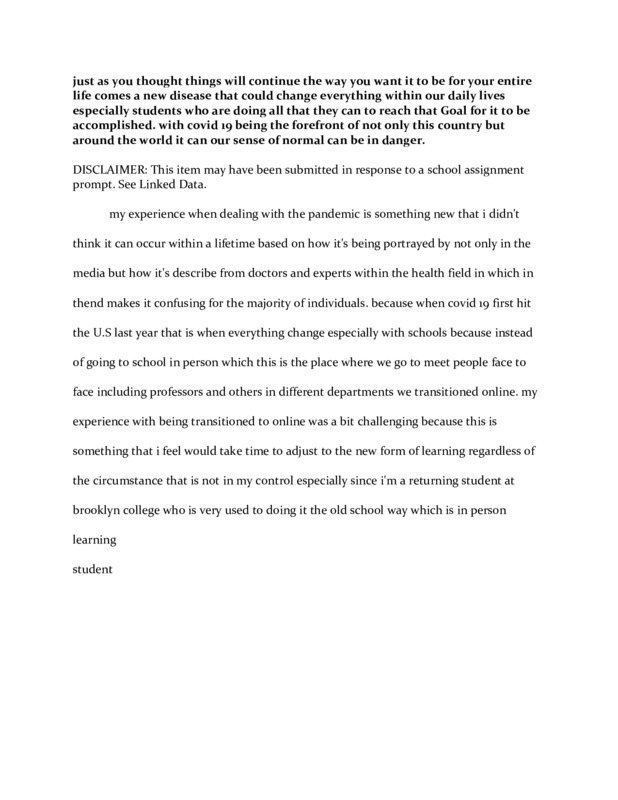 2020-03-11
2020-03-11just as you thought things will continue the way you want it to be for your entire life comes a new disease that could change everything within our daily lives especially students who are doing all that they can to reach that Goal for it to be accomplished. with covid 19 being the forefront of not only this country but around the world it can our sense of normal can be in danger.
my experience when dealing with the pandemic is something new that i didn't think it can occur within a lifetime based on how it's being portrayed by not only in the media but how it's describe from doctors and experts within the health field in which in thend makes it confusing for the majority of individuals. because when covid 19 first hit the U.S last year that is when everything change especially with schools because instead of going to school in person which this is the place where we go to meet people face to face including professors and others in different departments we transitioned online. my experience with being transitioned to online was a bit challenging because this is something that i feel would take time to adjust to the new form of learning regardless of the circumstance that is not in my control especially since i'm a returning student at brooklyn college who is very used to doing it the old school way which is in person learning -
 2020-12-03
2020-12-03Connecting Past COVID-19: #3
When this professor’s students hold up signs for him on camera in their Zoom classroom, he is more excited to see their faces for the first time after they had kept their cameras off all semester. -
 2020-12-04
2020-12-04Connecting Past COVID-19: #2
The professor of this class is not sure whether her students’ cameras are off intentionally or if she had made a mistake. She is subsequently surprised by her students holding “We love you” signs, saying she loves them back and asking to take a screenshot. -
 2020-12-09
2020-12-09Connecting Past COVID-19: #1
At first, the professor of this class thought that he had done something wrong when all of his students’ cameras were turned off on Zoom. He then thought it might be a new cool trend. He was surprised and emotional when his students surprised him with hand-made signs showing their thanks. -
2020-09-17
MW1: Covid University: I: The Chat Box
The pandemic forced us all to take online classes. We all miss the traditional classroom setting. But we all remember how awkward it was to ask questions. One thing about zoom is you can ask a question or make a comment in the chat box. This is a feature I hope get added to the in person class experience. It adds so much to the productivity and the curiosity of student. Being able to just add a question into the chat log, then the teacher peeks at it and answers when they have time or if its immediately relevant. No classroom disruption, no being shy, just unadulterated curiosity. -
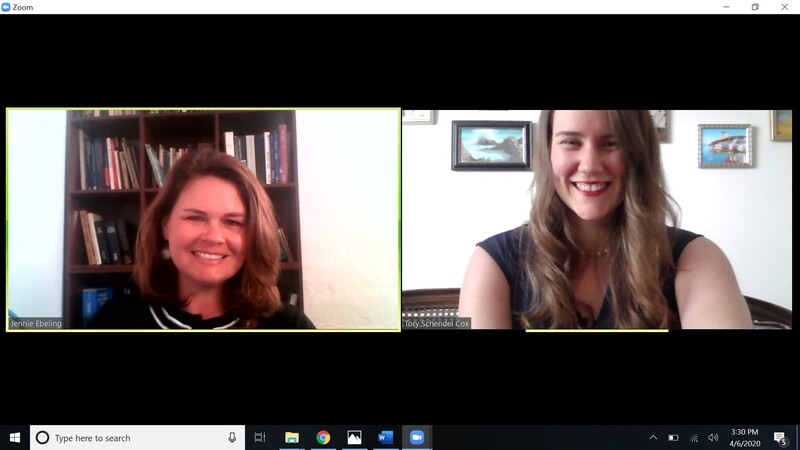 04/07/2020
04/07/2020Cultural Insights: Interviews in the Creative Sector #16 … Jennie Ebeling, PhD, University of Evansville
In response to COVID-19, the Evansville Museum of Arts, History and Science launched the mini-series, "Cultural Insights: Interviews in the Creative Sector," to highlight colleagues and professionals working in the same or similar field of museum professionals. -
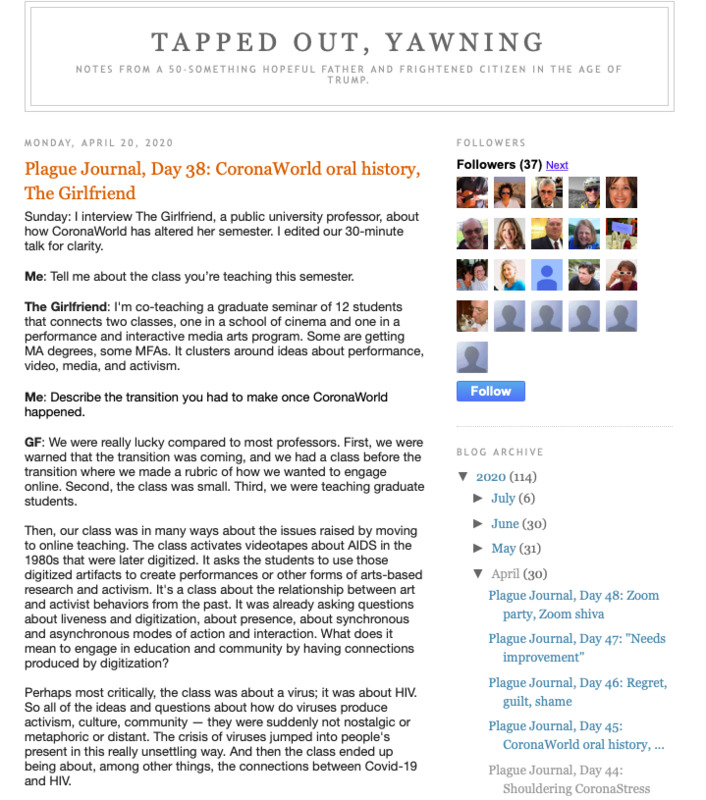 2020-04-20
2020-04-20Plague Journal, Day 38: CoronaWorld oral history, The Girlfriend
I'm keeping a Covid-19 journal. In the latest entry, I talk to The Girlfriend, a college professor, about her struggle to shift her semester class to the digital realm in CoronaWorld. -
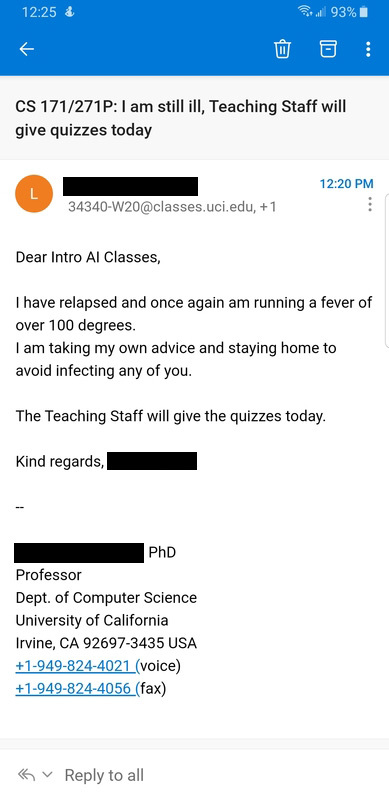 2020-03-05T12:25:09+00:00
2020-03-05T12:25:09+00:00Teaching under the COVID-19
My professor got a fever of over 100 degrees. For the safty measurements, he chose to stay at home to prevent potential risk of spreading the COVID-19 in campus. The lecture is mostly canceled except the quiz. Later, quizzes were held online as well. -
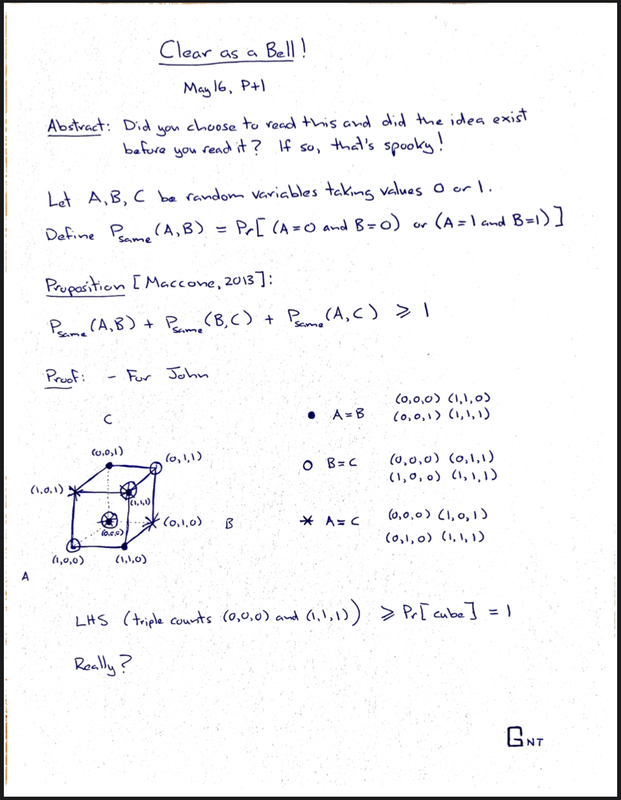 2020-05-16
2020-05-16Living inside my head.
The self isolation during lockdown gifted me time to reflect on the nature of reality. The result was a visual proof of Bell’s inequality. Ironic for a blind man! -
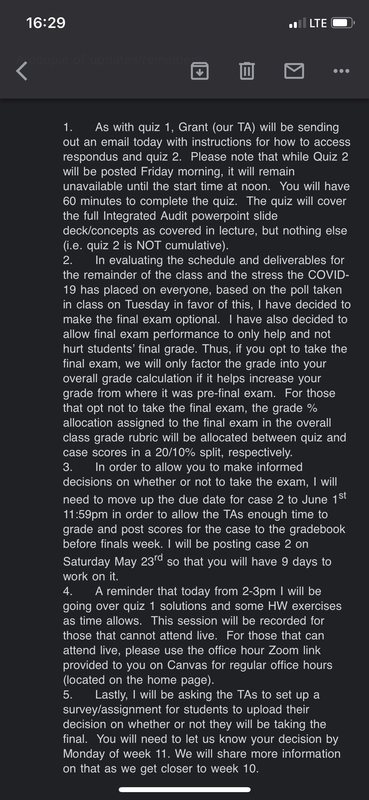 2020-05-25
2020-05-25An optional final due to Coronavirus concern of email from professor
Due to coronavirus, many people lost their job and concern about their lives. Professor sent us this email to help us to get out of the trouble of coronavirus that she gives us a chance to take optional final. -
 2020-05-21
2020-05-21Covid 19 Pandemic
-
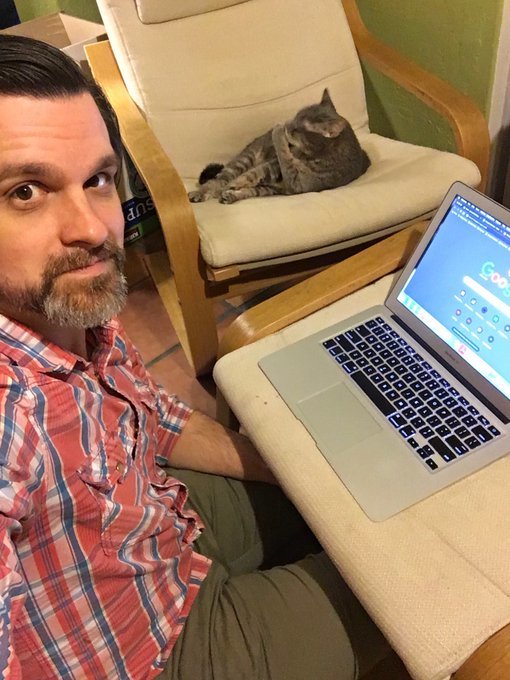 2020-04-10
2020-04-10#SHPRSspace: Part 1
A faculty member of Arizona State University's School of Historical, Philosophical and Religious Studies working from home. -
2020-05-04
The Burdens of Online Classes
Hi everyone, As I write this I feel as if this is like a time capsule that future generations will see or read and learn about our experience. For me, it goes like this, my name is Vianney Ruiz and I am a student Tempe's Arizona State University, I am currently studying Mechanical Engineering as well as French. Why French you ask? I seem to have a passion for languages, but I can't just study French so I decided to combine it with Engineering. Now I am back in Texas, I had to give up my new job as an ambassador for Microsoft and online classes do not live up to the standards that universities say they do. On the other hand, it is me who has the problem, why can't I seem to live up to my own standards when I appear to have more time on my hands? Did I have a class in ten minutes? It is one hour past the time. How could I have forgotten? I reminded myself ten minutes before class. I tell myself there is nothing to be done, I simply send an apology email to my professor. I go on with my day, when suddenly I panic did I have a quiz today? I hurry to Canvas. Phew, I am good, no problem. On other days it's, oh no I missed th quiz. I read the announcement, told myself I had a quiz, why did I forget? Once again sends email apologizing to the professor and even decide to ask for a retake. The professor replies back granting me the permission to retake it. Oh, thank God, I feel such relief. Now, what about my C++ class? I was having so many problems with the professor's teaching style before, how will I do it now? I decide to contact my fellow classmates and see if we can work together on assignments. They say yes, I feel relieved. How will I do my final project? This is something I have to do alone. I ask my dad if any of his co-workers if they have any experience with coding. He says he will ask. The next day he forgets, what will I do? Should someone do it for me? No, that's not like me, I will do my best and assume responsibility. Finally, my dad remembers to ask, someone, contacts me, do I know arrays, vectors, structures? I do not know how to answer. I answer honestly, I laugh at myself and say, my current professor, is a student himself, he has a long way in his teaching career, he went over them, but I found it hard to understand him. -
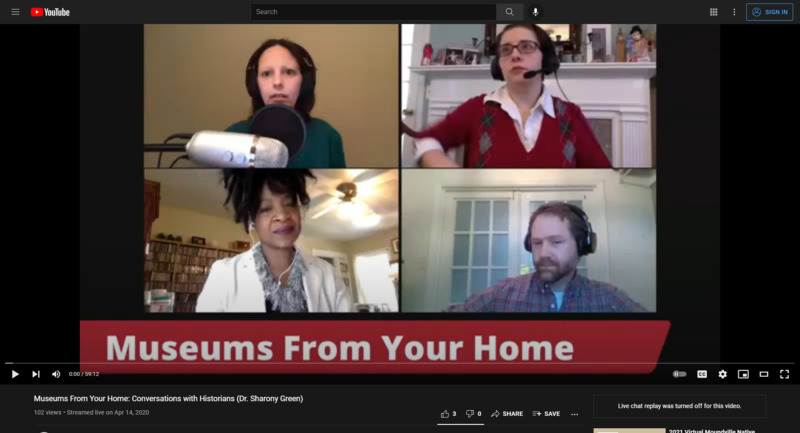 2020-04-14
2020-04-14Alabama professor addresses life/work/pandemic w/ UA Museums
While addressing the way in which she uses museums and local histories in her research and teaching, University of Alabama was surprised how she twice referenced the pandemic perhaps to show how her journey to academic life has come full circle. She went back to school after watching the Towers fall on 9/11. -
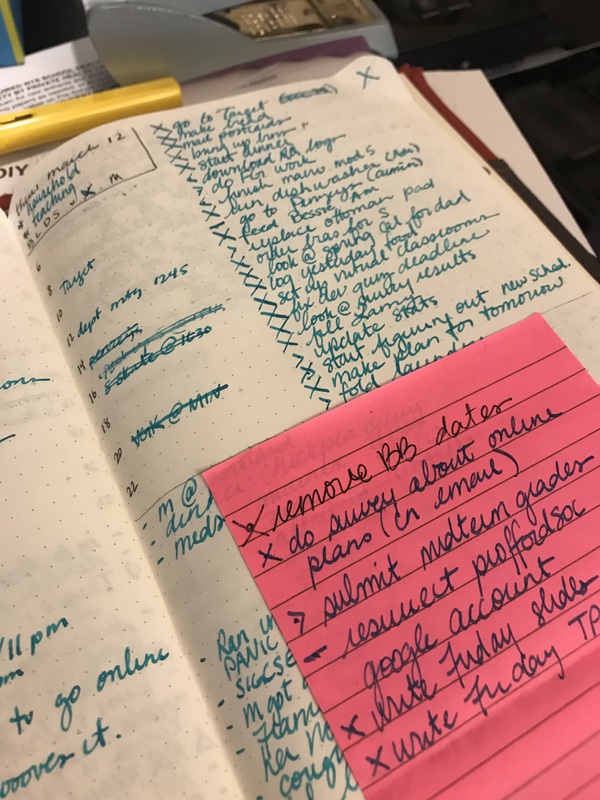 2020-03-12
2020-03-12an overflowing to-do list
an overflowing to-do list from the day after my institution made the decision to transition to remote learning -
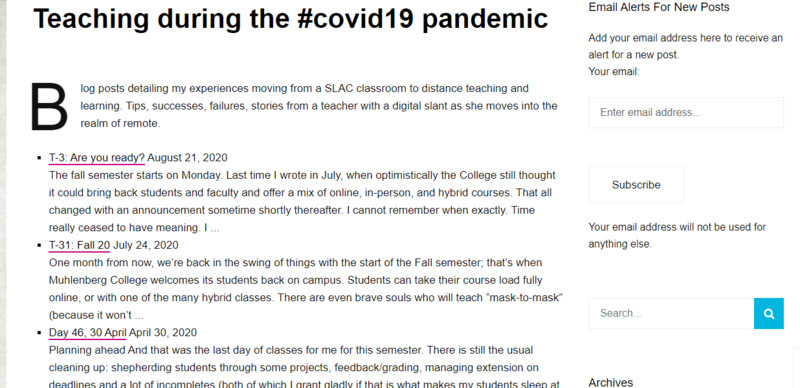 2020-03-16
2020-03-16Teaching during the #covid19 pandemic
Daily blog post of an assistant professor who’s had to go remote -
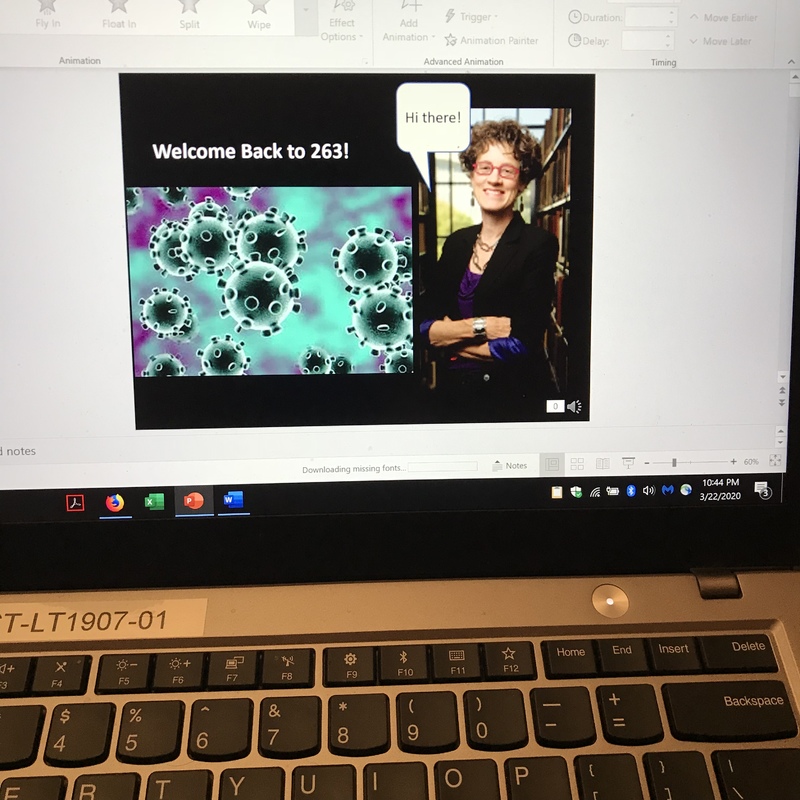 2020-03-22
2020-03-22First voice-over power point for first day of now online US history of medicine class.
First PowerPoint of 55 min recorded lecture. First time I’ve ever added voice over to PowerPoint images I usually show in class. Usually I see my students, I ask them questions and interact with them. I use the blackboard to underline points as well. They break into groups to discuss primary sources. It took 10 hours today, Sunday, to learn this new skill and translate my lecture into a new format: new images, voice recorded for each one. Most poignant is the first one in which I am saying hello, talking about the weird situation we are all in, telling them that i miss them, and that they should not worry. The goal is for them to learn as best they can under weird conditions but this class should not add to their stress. They need to take care of their own health and their families. The image represents what every professor in the country was asked to do over spring break—in the flurry of stress, shopping for possible 2-week quarantine, thinking about Home-schooling and absorbing conflicting information. And an election in Illinois and other states. We do as best we can because we care about our students. But the dozens of messages from the administration are unhelpful. This icommand from above for instantaneous online education represents hard work. We will all do the best we can.
